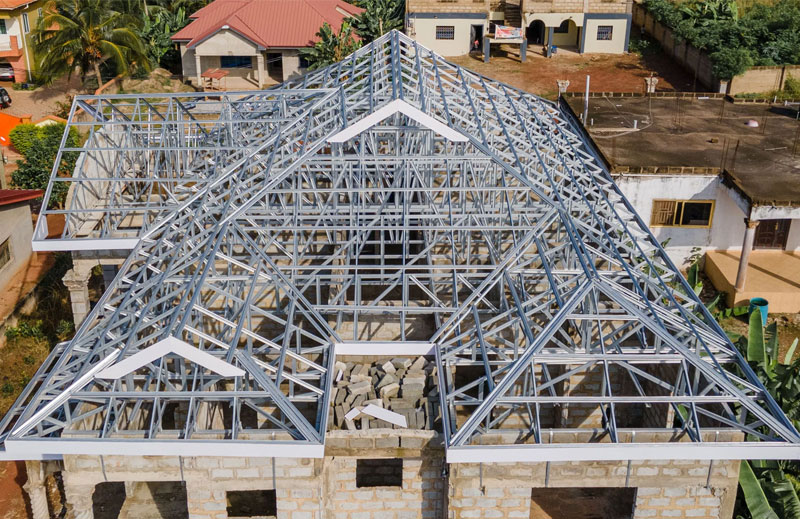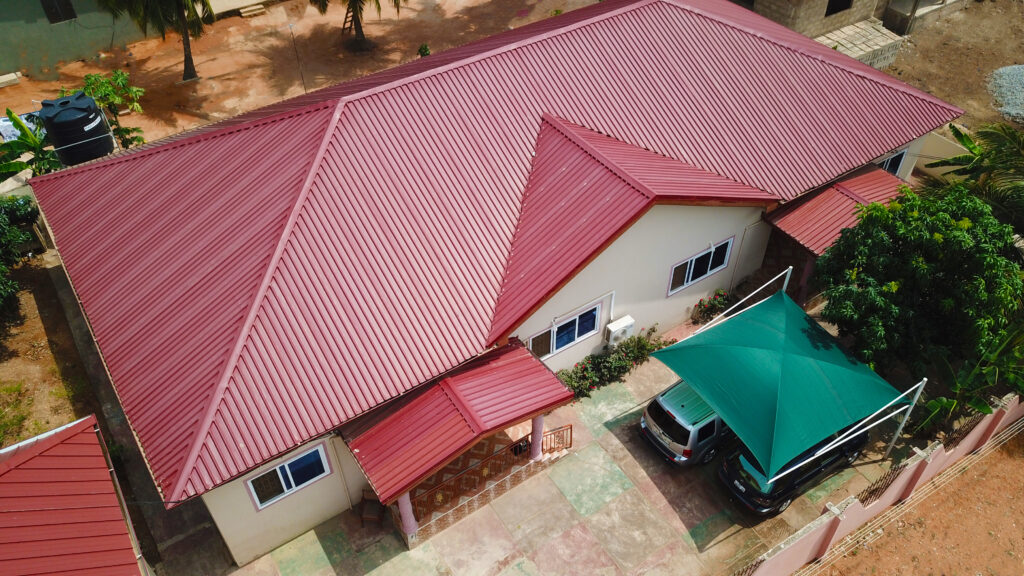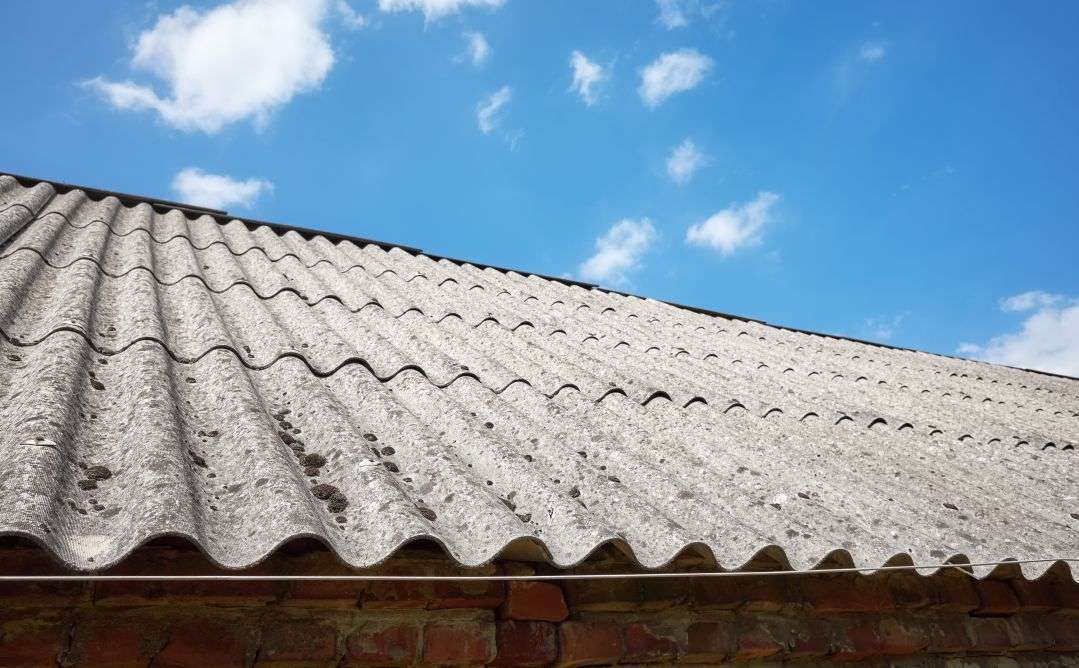Are you considering a roofing project in Ghana? Did you know that the type of roofing material you choose can have a significant impact on the cost and lifespan of your roof? Well, here’s an interesting statistic for you: according to recent research, the average lifespan of a roof in Ghana is around 10 to 15 years. Now, you might be wondering what factors to consider, what types of roofing materials are available, and how to maximize the cost benefits of your roofing project. Don’t worry, we’ve got you covered. In this comprehensive guide, we will walk you through the planning process, explore the different types of roofing materials commonly used in Ghana, discuss the cost benefits of each option, and provide tips for maintaining and caring for your roof. So, let’s dive in and discover everything you need to know about roofing in Ghana.
Factors to Consider for Your Roofing Project
When planning your roofing project, there are several important factors to consider for a successful and long-lasting outcome. Two key factors to keep in mind are roofing materials selection and roofing project budgeting.
Choosing the right roofing materials is crucial for the durability and longevity of your roof. Consider factors such as the climate in your area, the slope of your roof, and the overall aesthetic you’re aiming for. Common roofing materials include asphalt shingles, metal, clay tiles, and concrete tiles. Each material has its own advantages and disadvantages in terms of cost, durability, and maintenance requirements. Researching and comparing different materials will help you make an informed decision that suits your needs and budget.
Another crucial factor to consider is your roofing project budget. It’s important to have a clear understanding of your financial capabilities and set a realistic budget for the project. Take into account the cost of materials, labor, permits, and any additional expenses that may arise. It’s also wise to leave some room in your budget for unexpected expenses or changes in plans.
Common Types of Roofing Materials in Ghana
One of the most common types of roofing materials used in Ghana is corrugated metal sheets, which are known for their durability and affordability. These metal roofs are widely used in both urban and rural areas due to their ability to withstand the harsh weather conditions in Ghana. They are resistant to extreme heat, heavy rainfall, and strong winds, making them an excellent choice for homeowners and businesses alike.
When it comes to roofing materials in Ghana, thatch roofs are also quite popular. Thatch roofs are made from natural materials such as palm leaves, grass, or reeds, which are layered to create a waterproof and insulating barrier. They have been used for centuries and are known for their rustic charm and eco-friendliness. Thatch roofs provide excellent insulation, keeping the interiors cool during hot weather and warm during cold weather.
Read Also | 10 Facts About DBS Roofing Ghana Limited (MUST Know Before Buying)
Cost Benefits of Different Roofing Options
If you’re considering different roofing options in Ghana, it’s important to understand the cost benefits associated with each choice. One factor to consider is energy efficiency. Opting for roofing materials that are energy efficient can help you save on your energy bills in the long run. For example, metal roofs have high solar reflectance and thermal emittance, which means they can reflect sunlight and reduce the amount of heat absorbed by your home. This can lead to lower cooling costs, especially in the hot Ghanaian climate.
Another cost benefit to consider is the environmental sustainability of your roofing materials. Choosing environmentally friendly options can not only save you money but also contribute to a greener future. For instance, opting for green roofs, which are covered with vegetation, can provide natural insulation, reducing the need for heating and cooling. Additionally, they can help mitigate stormwater runoff, which can lead to costly drainage issues.
When comparing the cost benefits of different roofing options, it’s essential to consider both energy efficiency and environmental sustainability. While some materials may have a higher upfront cost, they can provide long-term savings in energy consumption and maintenance. So, take the time to research and understand the cost benefits of each roofing option to make an informed decision that aligns with your budget and sustainability goals.
Tips for Planning Your Roofing Project
To effectively plan your roofing project, it is crucial to consider a few key factors that will ensure its success and longevity. Here are some tips to help you plan your roofing project:
Roofing project timeline: Creating a timeline for your roofing project is essential to ensure that it stays on track and is completed within the desired timeframe. Consider factors such as weather conditions, availability of materials, and the complexity of the project when determining the timeline.
Roofing project budgeting: Before starting your roofing project, it is important to establish a budget. This will help you determine the overall cost of the project and ensure that you have allocated enough funds to cover all necessary expenses. Consider the cost of materials, labor, permits, and any unexpected expenses that may arise during the project.
Lifespan of Different Roofing Materials in Ghana
When considering the lifespan of different roofing materials in Ghana, it is important to compare their durability. Factors such as climate, maintenance, and quality of installation can greatly affect how long a roof will last. By understanding these factors and taking the necessary steps to ensure proper maintenance, you can extend the lifespan of your roofing material and avoid costly repairs or replacements in the future.
Material Lifespan Comparisons
Different roofing materials in Ghana have varying lifespans, making it important to carefully consider the durability and longevity of each option before making a decision. When it comes to long term durability, some materials outshine others. Here are two sub-categories to help you understand the lifespan and maintenance requirements of different roofing materials:
1. Traditional Roofing Materials:
Thatch: Durable, but requires regular maintenance to prevent decay and pest infestation.
Clay tiles: With proper maintenance, they can last up to 50 years, but may crack due to extreme weather conditions.
2. Modern Roofing Materials:
Metal sheets: Highly durable and can last up to 70 years with minimal maintenance.
Concrete tiles: Known for their strength and longevity, lasting up to 50 years or more.
Factors Affecting Durability
Considering the lifespan of different roofing materials in Ghana, it is crucial to understand the factors that affect their durability and longevity. There are several key factors that can prolong the durability of roofing materials in Ghana. Firstly, the quality of the material itself plays a significant role. High-quality materials tend to have a longer lifespan compared to low-quality ones. Additionally, proper installation techniques and regular maintenance are important in ensuring the longevity of the roof. Neglecting maintenance can lead to premature deterioration. Furthermore, the impact of weather conditions cannot be underestimated. Ghana experiences a wide range of weather conditions, including heavy rainfall, strong winds, and intense heat. These factors can take a toll on the roof and reduce its lifespan. Therefore, it is essential to choose roofing materials that are resilient and can withstand Ghana’s climate.
Maintenance for Longer Lifespan
To ensure a longer lifespan for your roofing materials in Ghana, proper maintenance is crucial. Regular roofing maintenance and care not only extend the life of your roof but also help prevent costly repairs and replacements. Here are some essential tips to keep in mind:
Clean your roof: Remove debris, leaves, and dirt that can accumulate over time, as they can trap moisture and cause damage.
Inspect for damage: Regularly inspect your roof for any signs of wear, such as cracked or missing shingles, leaks, or mold growth.
Address repairs promptly: If you notice any issues during your inspection, it’s important to address them as soon as possible to prevent further damage.
Schedule professional inspections: Consider hiring a professional roofing contractor to conduct a thorough inspection at least once a year.
Maintenance and Care for Your Roof in Ghana
Maintaining and caring for your roof in Ghana is crucial to ensure its longevity and protect your home from potential damage. Regular roofing inspections are essential to identify any issues before they escalate into costly repairs. It is recommended to have a professional inspection at least once a year, especially after severe weather conditions like heavy rains or strong winds.
During these inspections, the roofing expert will thoroughly examine your roof for any signs of damage, including loose or missing shingles, cracked tiles, or damaged flashing. They will also inspect the gutters and downspouts to ensure proper drainage. If any leaks are detected, immediate repair is necessary to prevent further damage to your roof and the interior of your home.
Repairing leaks should be a top priority when it comes to roof maintenance. Even a small leak can lead to significant water damage, mold growth, and structural issues if left unaddressed. Depending on the extent of the damage, repairs may involve resealing the affected area, replacing damaged shingles or tiles, or fixing faulty flashing.
In addition to inspections and repairs, it is important to take proactive steps to care for your roof. Regularly clean the gutters and remove any debris that may accumulate on the roof, as this can lead to water pooling and deterioration. Trim overhanging branches to prevent them from rubbing against the roof and causing damage.
Frequently Asked Questions
Are There Any Specific Building Codes or Regulations in Ghana That I Need to Follow When Planning My Roofing Project?
When planning your roofing project in Ghana, it is important to be aware of the specific building codes and regulations that must be followed. These regulations include obtaining building permits and adhering to roofing regulations set by the local authorities. Building permits are required to ensure that your project meets safety standards and complies with local regulations. Familiarizing yourself with these codes and regulations will help ensure a smooth and successful roofing project in Ghana.
How Can I Determine the Appropriate Size and Slope for My Roof in Ghana?
To determine the appropriate size and slope for your roof in Ghana, you need to consider several factors. Firstly, the size of your roof should be based on the dimensions of your building and the amount of space you require. Secondly, choosing the right slope depends on the weather conditions in Ghana and the type of roofing material you plan to use. A steeper slope is recommended for areas with heavy rainfall to prevent water accumulation and potential damage.
Are There Any Environmental Factors in Ghana That I Should Consider When Choosing a Roofing Material?
When choosing a roofing material in Ghana, it’s crucial to consider the environmental factors. Certain materials have a greater impact on the environment than others. For example, metal roofs are a sustainable option as they can be recycled and have a long lifespan. On the other hand, asphalt shingles may not be as environmentally friendly due to their production process and disposal. By selecting a roofing material that minimizes environmental impact, you can contribute to a greener and more sustainable future.
Are There Any Alternative Roofing Options in Ghana That Are Eco-Friendly or Sustainable?
When it comes to roofing options in Ghana, there are definitely alternative materials that are both eco-friendly and sustainable. You have the choice to go for roofing materials such as bamboo, thatch, or recycled metal. These options not only have a lower impact on the environment, but they also offer long-lasting durability. Bamboo, for example, is a renewable resource and can withstand harsh weather conditions. Thatch roofs, on the other hand, provide natural insulation and are biodegradable. So, if you’re looking for environmentally friendly choices, these alternatives are worth considering.
What Steps Can I Take to Ensure the Longevity and Durability of My Roof in Ghana’s Climate?
To ensure the longevity and durability of your roof in Ghana’s climate, there are several steps you can take. Regular roof maintenance is key, such as cleaning gutters and inspecting for any damage. Additionally, weatherproofing techniques like sealing cracks and applying a protective coating can help prevent leaks and damage from the elements. It’s important to address any issues promptly to avoid costly repairs down the line.
Conclusion
In conclusion, when it comes to roofing in Ghana, it is crucial to consider factors such as climate, budget, and desired aesthetics. With various roofing materials available, including metal sheets, tiles, and thatch, it is important to weigh the cost benefits and lifespan of each option. Proper planning and regular maintenance can ensure the longevity of your roof. By understanding these factors, you can make an informed decision and enjoy a durable and aesthetically pleasing roof for years to come.
Discover more from Ghana Scoop
Subscribe to get the latest posts sent to your email.





